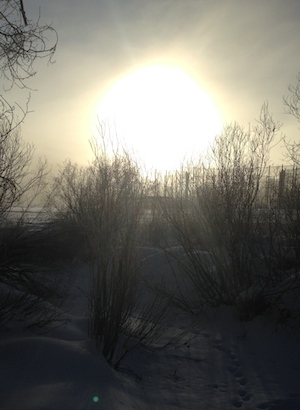As I stroll the frozen river path behind our home, I keep gingerly touching my left shoulder. It seems like there should be a bruise there. It feels like I got slugged— hard. It wasn’t a punch, but there is a battle going on under the skin of that arm. My body’s white blood cells have deployed and are frantically creating antibodies to defend against an unwelcome visitor: the poison tetanospasmin. The pain I feel is sort of like seeing black smoke rising from a distant battlefield— dramatic things are happening over there. And while I don’t endorse violence or pain as a way to crystalize one’s intentions, oddly this aching left arm seems to have helped me turn a certain corner on my next project.
For two years now the professional side of me has been extremely turned on by my mission to make a film in Bhutan. I’m heading over this April with a hand-picked cast and crew for an adventure on a wild, unexplored, threatened river. It’s got all the stuff my career thrives on: intriguing characters with deep passion and fascinating stories; a crew I trust but who, like me, seem a bit humbled by our expedition; a destination that awes the imagination and challenges the intellect; and— for me— an audacious leap out of my comfort zone.
It’s as if I’ve piled up all I’ve done before, climbed atop this unwieldy mound, and then stretched my arms and launched off. What is this sensation as I take to the air? The band Drive-By Truckers once crooned: “I’ve been falling so long it’s like gravity’s gone and I’m just floatin’.” Am I falling, floating, or flying now? Some days I’m not sure if I’m headed for a faceplant or a swooping arc through the air, but right now it feels like flying. And all due to this aching left wing.
The drops of poison in my arm are actually pretty benign. While they get a big response from my immune system, they won’t actually make me sick. But if clever scientists hadn’t pulled out their teeth, these drops of tetanospasmin would be marching toward my nervous system with bad intent. In about ten days I’d have lockjaw—tetanus—and would probably be fighting for my life.

This tetanus shot boosts another one from nine years ago, which, in turn, boosted an arsenal of vaccinations before my last trip to India. I’m getting shot up because the remote places where we’ll be filming are a long way from medical help and may well be teeming with the sort of invisible creepy crawlies that make us sick in really cinematic ways. But that’s not exactly the drama we want our cameras to capture.
I continue running my fingers over where the needle went in and ponder further. While I’m not exactly a thrill-junkie, I do get some excitement out of this physical reminder that I’m going there; way over there; deep, deep, deep into the way-over-there. And this, unlike the professional enthusiasm that has carried me through the two years of research and preparations so far, feels personal and intimate.
It takes me back to summers as a nature center staffer at Scout camp. I recall the “bear-foot” section of Mr. Bear’s Nature Trail where kids had to feel the moss between their toes to proceed (when building the trail, I had plucked the sharp rocks and thorns out myself by finding them with my own bare feet). I recall the tingle of excitement surrounding our rigorous scientific studies to determine if thirteen-lined ground squirrels and chipmunks prefer Froot Loops to Cheerios (they don’t, if I remember correctly, but perhaps John Gunther can double-check me). I can still feel what it was like to lead “night owl” hikes through deep forests using all of our senses except vision (and, in my case, without a sense of direction with which I was never gifted). Those things, from moss to chipmunks to near collisions with 100-foot spruce trees in the dark, were all experiences in nature that I could feel under my skin. And I suddenly find myself more excited for my own experience into the wilderness than for all the potentials of this film to reach others. Not that those other potentials went away, but this is what I’m feeling most right now.
I rub my arm again, wince, and, to Josie in my doctor’s office who administered the shot, I think: “Thanks, I needed that.”
Thanks for reading. Cheers,
![]()
Photos by yours truly